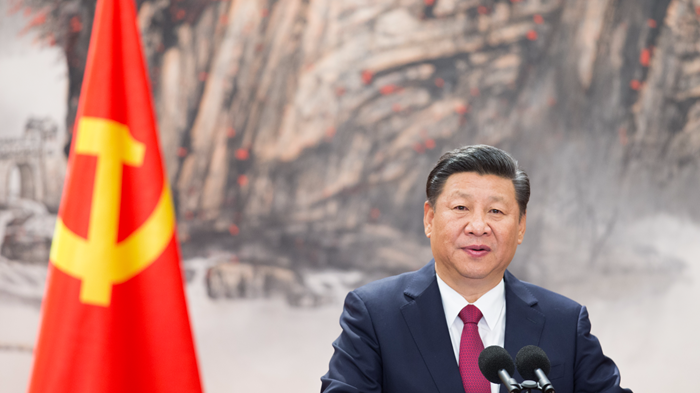Why China’s elite tread a perilous path
Wealth, power and fame are no defence against the arbitrary power of the Communist party
© James Ferguson
November 29, 2021 12:20 pm by
Gideon Rachman
Rui Chenggang made a strong impression on me. He was a young Chinese television anchor, whose tailoring was as impeccable as his English. We met in Davos in 2014, at a
press conference with Shinzo Abe. Rui asked the then Japanese prime minister a tough question — while also pointing out that, when in Tokyo, he used the same gym as Abe. In short, he was very pleased with himself.
We chatted after the press conference and Rui told me I must look him up, next time I was in Beijing. I never got the chance. Rui was
arrested for alleged corruption that summer and has not been seen in public again. The following year in Davos, I asked one of his Chinese colleagues what had become of Rui. She pulled a face and ran to the other side of the room.
The story of Rui Chenggang serves as my personal reminder of how quickly the rich and powerful can fall from grace in China. The most famous current example is the tennis player
Peng Shuai. Peng disappeared for several weeks after making an accusation of sexual assault against a senior Chinese leader, before reappearing in a series of staged photo and video appearances. Her future remains uncertain.
In China, the rich, famous and powerful are all vulnerable to disgrace, disappearance or worse. The phenomenon was highlighted by the headline of an
article in Forbes magazine in 2011: “Friends don’t let friends become Chinese billionaires.”
Citing statistics from the Chinese press, the article pointed out that 72 of the country’s billionaires had died premature deaths in the previous eight years. The original
piece in China Daily, which is published by the Communist party, provided the details: “Among the 72 billionaires, 15 were murdered, 17 committed suicide, seven died from accidents, 14 were executed according to the law and 19 died from diseases.”
Anyone who thinks that things have become less perilous for the rich and powerful in China in the intervening decade would do well to read Desmond Shum’s recently published book,
Red Roulette.
Shum and his wife, Whitney Duan, rose from poverty to become billionaire property developers. They drove a Rolls-Royce around Beijing and travelled the world in private jets. The couple thought nothing of spending $100,000 on wine at a single meal in Paris. Whitney thrived on her connections to China’s political elite — until she was arrested in 2017 and disappeared.
As
Red Roulette makes clear, this kind of sudden fall from grace is not uncommon. Shum and Duan’s redevelopment of Beijing airport hit a problem when one of their key contacts, Li Peiying, who was the airport’s general manager, disappeared without explanation. He was later charged with corruption and executed.
A key political contact, cultivated by Duan, was Sun Zhengcai, a fast-rising official tipped as a potential successor to President Xi Jinping. Sun was expelled from the Communist party and sentenced to life in prison for corruption in 2018. Shum argues that Sun was actually the victim of a “political hit job”.
Duan’s connections to Sun may, in turn, have led to her arrest. Or it could be that she was too close to the wife of former premier Wen Jiabao, whose family had become fabulously wealthy. Despite once being the second most powerful man in China, Wen is now reduced to communicating in code. A
memoir about his mother that he published in an obscure newspaper this year was read as a veiled criticism of Xi and was swiftly scrubbed from the internet.
Some believe that Peng Shuai may also be communicating in code. One of the photos released to prove that she is still alive showed her standing next to a photo of Winnie the Pooh. Xi is often derisively
compared with the portly bear.
International renown offers no protection from arbitrary power.
Jack Ma, Alibaba founder and China’s most famous businessman, dared to criticise Chinese regulators in October 2020. He has barely been
seen in public since.
Meng Hongwei was the first ever Chinese president of Interpol, but he was arrested on a trip home in 2018, charged with corruption and sentenced to more than 13 years in prison.
Sympathy for billionaires or party functionaries, brought down by the system that once elevated them, might be limited. But the powers of the Chinese state are used with even more ferocity against dissenting lawyers,
journalists and academics. As a recent report for Human Rights Watch illustrates, the authorities also often go after the
families of dissidents.
The nature of the Chinese system means that steering clear of politics is no protection. The business world is opaque and runs on connections, so everyone is operating in what Shum calls the “grey zone”, and is therefore vulnerable to a charge of corruption. All institutions are under the sway of the Communist party. A smart lawyer or diligent journalist will be no help if you are arrested. The courts have a
conviction rate of 99.9 per cent.
At the top of the system sits President Xi, a leader who has defended not only Mao Zedong but also
Lenin and Stalin. It was Stalin’s secret police chief, Lavrenti Beria, who once explained the absolute vulnerability of any individual in a police state, when he said: “Show me the man, and I will find the crime.”
[email protected]




